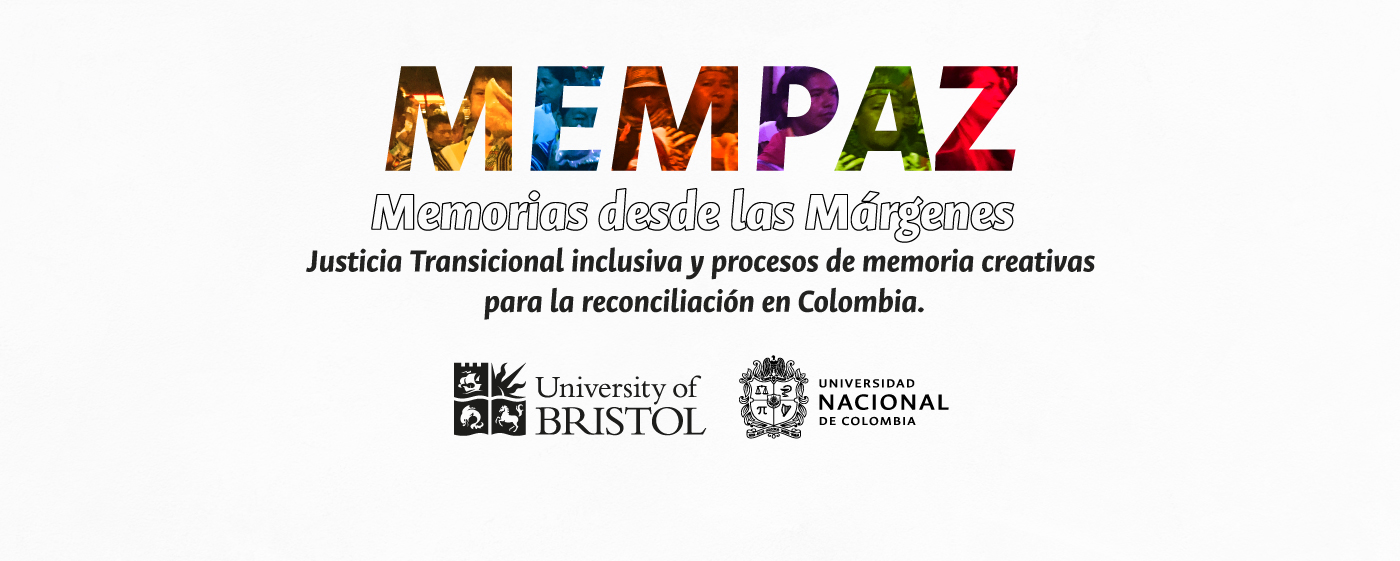The memories of marginalised communities need to be part of peacebuilding and transitional justice in Colombia
MEMPAZ, a partnership between the University of Bristol, the National University of Colombia, and grassroots organisations helps victims of conflict creatively process their experiences and therefore enables them to shape transitional justice on their own terms. This promotes plural memories of the past and challenges top down narratives of conflict.
About the research
Since 2018, the “Bringing Memories from the Margins” (MEMPAZ) project has been working with grassroots organisations adopting a participatory, co-production methodology to support community members in Bajo Cauca, Cartagena del Chairá, Florencia, Pueblo Bello, and Valledupar - some of Colombia’s most marginalised municipalities - to produce creative pieces of memory work. These memory pieces are being transformed into pedagogical tools and displayed on regional, national and international stages, in some cases with the participation of Colombia’s Truth Commission. In this way, the MEMPAZ project gives voice to memories from the margins, sharing the pain and resistance against the horrors of the past. Crucially, the memory pieces create shared demands for the present and future of transitional justice institutions in ways chosen by victims themselves. Co-creating communication strategies to disseminate these memories ensures that they are shared beyond formal transitional justice mechanisms and reach local and national audiences. MEMPAZ is also a space where grassroots partners share their methodologies for enabling memory work with the most marginalised and learn from each other’s practices.
The project operates through a horizontal partnership between universities, cultural institutions and grassroots organisations. In a first phase, the grassroots organisations designed and produced a series of reflective memory pieces. In September 2019, they presented the pieces to one another in the first MEMPAZ encounter. In October 2019, members of the Truth Commission and other partners participated in a week of events at the University of Bristol to discuss the findings so far. During 2020, the grassroots organisations will present their memory initiatives in regional settings across Colombia and in meetings with the Truth Commission. Between 2020 and 2021, they will present the memory pieces to a global audience. In autumn 2021, the Truth Commission and other institutions of the transitional justice system will be invited to the final MEMPAZ encounter in one of the conflict-torn regions of Colombia so that the margins become the central stage for transitional justice, sharing memories on victims’ own terms.
Memory initiatives - such as local museums, music composition and popular theatre - have played an important role in contesting official history in Colombia. Since the 1970s, victims and human rights organisations have denounced the wrongdoings of all participants. However, it was only in 2007 that the memories of victims were included in reports authored by state institutions. This boosted grassroots organisations’ memory initiatives, which have proliferated since the 1990s, and recognised victims as key actors in state-led peacebuilding efforts.
Victims and grassroots organisations participated in the negotiations between the Colombian government and the Revolutionary Armed Forces of Colombia-People’s Army (FARC-EP). Thanks to their participation, a range institutions and reforms, including a Truth Commission, a Peace Tribunal, a Unit for the Search for Disappeared People and the reform of the 2011 Victims Law, were established under the 2016 Final Peace Agreement. Together these comprise the most comprehensive transitional justice system in the world to date. This set of judicial and non-judicial instruments seek to identify and redress human right abuses and their legacies, however it is crucial that the voices of those most marginalised by conflict are heard and valued within transitional justice processes. To ensure this happens, victims and communities need to share memories on their own terms.
Policy implications
• Memory work created by grassroots organisations and victims can and should be seen as testimony and treated as such in transitional justice processes.
• Transitional justice processes need to take into account the colonial, racist and patriarchal underpinnings of conflict and creative memory work offers proposals for how to do this.
• Using memory of everyday acts (cooking, singing, being together) as part of the transitional justice process can increase participation and merits further research.
• Educators and policymakers should acknowledge and create space for the contributions of grassroots memory work to formal education.
• Research should be co-produced with grassroots organisations with trust, time and integrity.
Grassroots memory work supported by MEMPAZ
The Ruta Pacífica de las Mujeres (Pacific Route of Women) uses theatre with women victims of the armed conflict in Caucasia and Cáceres, Antioquia . Ruta Pacífica has developed this methodology, which aims to support women to share what happened to them and heal the wounds of the war.
"We feel we are healing because we can tell the truth of the horrors lived through the play. We let our emotions travel across our bodies and this allows women who had not spoken before to speak out. When the stories come out we can rebuild ourselves. There are similar stories, but each woman who gets it out lives the experience in a particular way. The stories allow us to ask questions that go beyond the individual, ques tions that are connected to the destruction of the social fabric and of nature." (Aura quoted during MEMPAZ’s memory encounter in Pueblo Bello, October 2019).
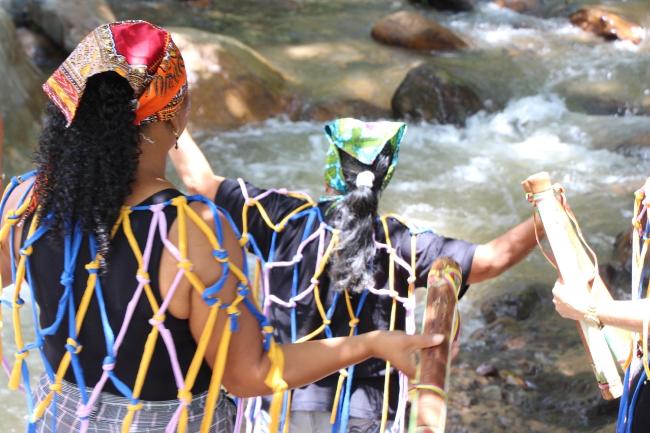
Mujer Misterio de Amor que Da Vida a la Vida (Woman Mystery of Love that Gives Life to Life) uses food to bring forcedly displaced people in Cartagena del Chairá and Florencia (Caquetá) together and rebuild their communities. The table provides a space around which people can talk about the past and share strategies for everyday survival. The food that once kept them alive now brings lively community interactions, thus helping them recuperate and creating a new culinary tradition at the same time. Linking food and memory together has inspired participants to set up a peace shop, which gives additional income to the community.
“The communal shop allowed members of the community to share experiences before, during and after the forced displacement; this, together with engaging in an economic activity and in leisure pastime playing games, such as chess and dominos, helped rebuild the social fabric” (Andrea quoted during MEMPAZ’s memory encounter in Pueblo Bello, October 2019).
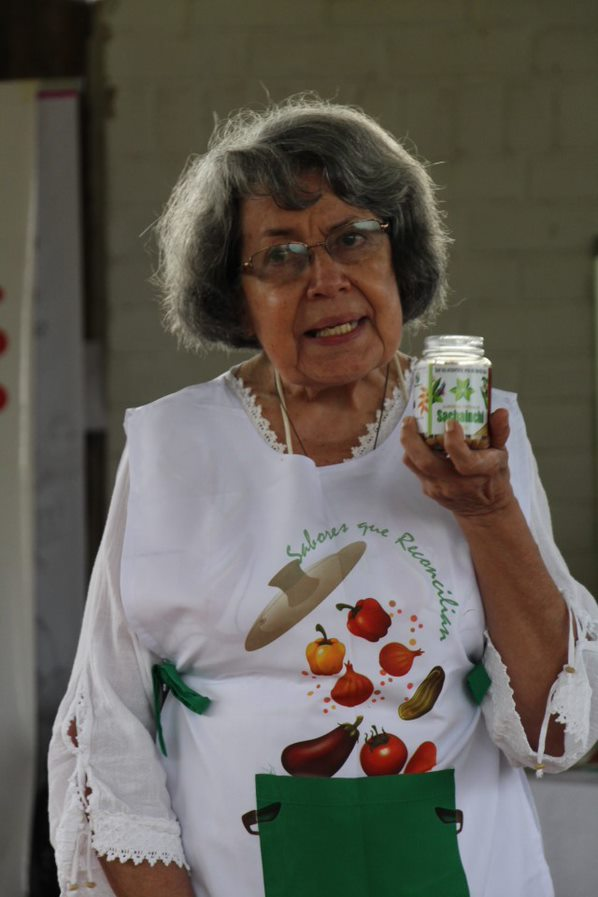
The Museo de Memoria del Conflicto de Valledupar (Valledupar’s Memory Museum of the Conflict) develops songs with victims, often using the vallenato style that the region is famous for. These songs support victims to revisit their experiences during the armed conflict and to transform these memories into lyrics. By singing about the realities experienced in their communities, victims overcome the silence that had been imposed by armed actors.
“When the paramilitary groups arrived in April 1998, they took people from their houses and killed two people in front of everyone. Through violence they controlled the territory. Children were asked to remain silent” (Felicia quoted dur ing MEMPAZ’s memory encounter in Pueblo Bello, October 2019).
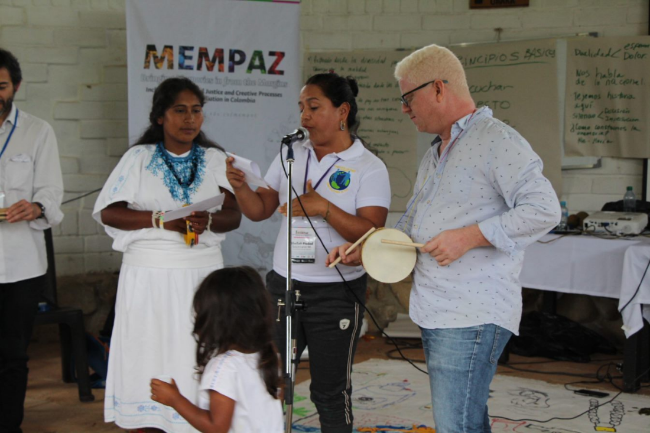
The Colectivo de Comunicaciones de Simonorua Youth Communications Collective), with support from Colombia’s Biblioteca Nacional (National Library) uses new technologies (drones and digital cameras) to complement traditional indigenous Arhuaco storytelling. By taking and sharing photos, the group can expand their memories, thereby protecting and sharing them in a culturally appropriate way.
“Outsiders used to document our story before, now it is us.” (Kwaringumu quoted during MEM PAZ’s memory encounter in Pueblo Bello, October 2019).
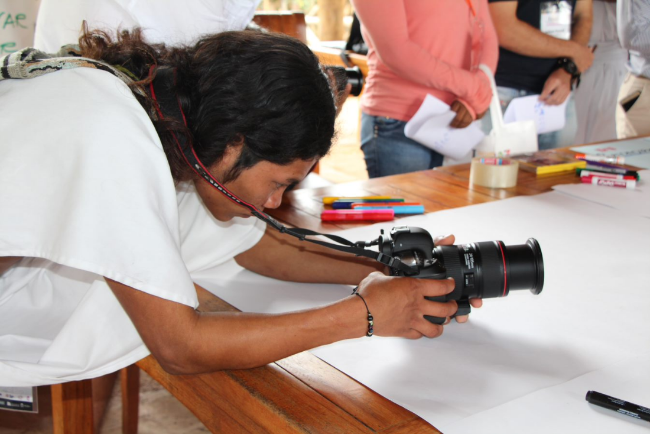
Rodeemos el Diálogo (Embrace Dialogue) uses memory activities to reflect on the impact of the conflict on marginalised regions and the complexity of building truth in Colombia with students and teachers. It is also building a network of teachers in Bogotá, Cali and Pasto to make sure that they continue teaching about memory and truth.
“If we identify student’s emotions, we can trans form the negative perception of the peace agree ment, which is usually based in misunderstand ings circulated on social media through fake news.” (Karen quoted during MEMPAZ’s memory encounter in Pueblo Bello, October 2019).
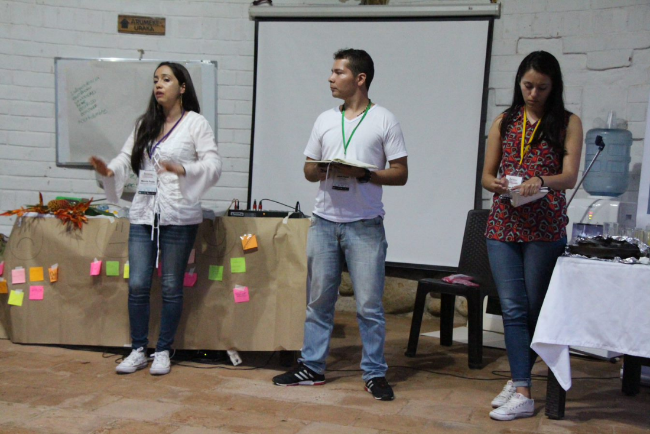
Key findings
• The memory-building initiatives of grassroots organisations contribute to the everyday life of conflicttorn regions, opening restricted spaces and creating possibilities for reconciliation. Acknowledging the resilience and resourcefulness of grassroots organisations is fundamental to navigating the challenges of transitional contexts.
• Contrary to mainstream transitional justice, often criticised for having a top-down approach, Colombia’s transitional justice system is finding ways to work together with grassroots organisations in conflict-torn regions. Accepting memories created by and shared on the victims’ terms is crucial to making this process successful.
• Grassroots organisations can help document unheard wrongdoings of the past by using appropriate creative methodologies, essentially collecting testimonies in a way that works for victims. This enables them to play a role connecting communities and transitional justice institutions.
• Transitional justice institutions operate on short timescales and are often criticised for leaving a limited legacy in the communities most affected by conflict. MEMPAZ partners’ long-standing relationships in the communities where they work have enabled trust and have drawn on participants’ historical knowledge to produce memories that have relevance to communities in the present and future.
• Economic, artistic, educational, and cultural projects are examples of long-term processes that help rebuild the social fabric in conflict-torn regions. Memory-building activities go beyond unearthing hidden stories of victimisation, they enable resistance and resilience and collectively explore pathways for healing.
• Colombia’s peace process has already faced significant political challenges and is now affected by the global pandemic. Grassroots organisations adapt to changing conditions and use new technologies and creative methodologies to transform memory-building complementing, protecting and expanding the reach of top down transitional justice approaches.
Further information
MEMPAZ (Bringing Memories from the Margins, AH/R013659/1), is an academic collaboration (2018-2021) between the University of Bristol and the National University of Colombia, funded by the Arts and Humanities Research Council, the Newton Fund and Colombia’s Ministry of Science and Technology. The project is based on a partnership with four grassroots organisations: The Pacific Route of Women, the Colombian Network of Memory Sites, Women Mystery of Love that Gives Life to Life, Embrace Dialogue, and two state institutions: the National Library of Colombia and the Truth Commission created by the 2016 Peace Agreement. More information can be found in MEMPAZ website.
Authors
Policy Report 60: June 2020
The memories of marginalised communities in Colombia (PDF, 1,108kB)
Contact the Researchers
Matthew Brown, University of Bristol, Matthew.Brown@bristol.ac.uk
Andrei Gomez-Suarez, University of Bristol, a.gomez-suarez@bristol.ac.uk
Fabio Lopez de la Roche, National University of Colombia, felopezd@unal.edu.co
Julia Paulson, University of Bristol, julia.paulson@bristol.ac.uk
Maria Teresa Pinto, National University of Colombia, mtpintoo@unal.edu.co
Martin Suarez, National University of Colombia, martin.suarez@bristol.ac.uk
